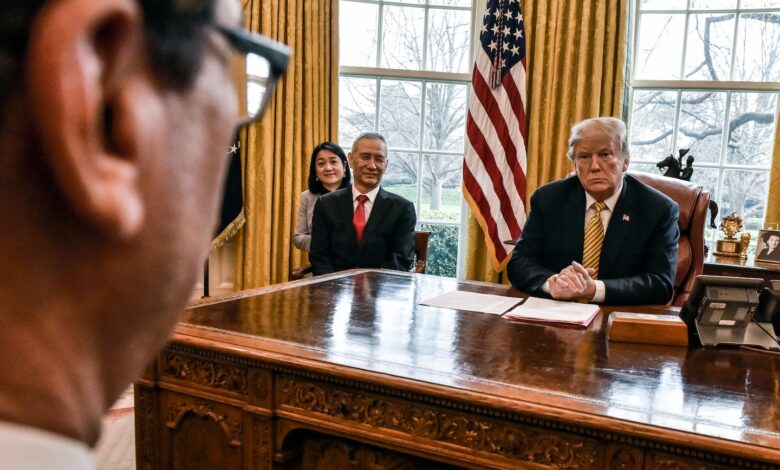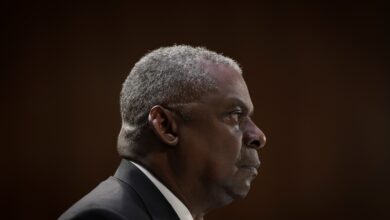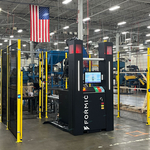Trump eyes massive escalation in economic war with China

Privately, Trump has discussed with advisers the possibility of imposing a flat 60 percent tariff on all Chinese imports, according to three people familiar with the matter who spoke on the condition of anonymity to relay private conversations.
All these options would lead to enormous disruptions to the U.S. and global economies that would far surpass the impact of the trade wars of Trump’s first term, economists of both parties say. Although he often praised Xi Jinping as president and signed a 2020 trade deal with China, Trump now repeatedly bashes Beijing on the campaign trail and has promised a tougher stance than President Biden.
Trump’s determination to ratchet up trade fights with Beijing reflects the emerging economic stakes of the 2024 election, as the former president appears increasingly sure of winning the GOP nomination. Trump has floated some fanciful new ideas for his second term — like building “Freedom Cities” in different parts of the United States with flying cars — but has primarily focused on intensifying policies he pursued during his first term, such as a severe immigration crackdown, cuts to corporate taxes and disruptive new tariffs on U.S. trading partners.
“The 2018 to 2019 trade war was immensely damaging, and this would go so far beyond that it’s hard to even compare to that,” said Erica York, senior economist at the Tax Foundation, a right-leaning think tank that opposes the tariffs. “This threatens to upend and fragment global trade to an extent we haven’t seen in centuries.”
A Trump campaign spokesman did not return requests for comment.
Biden has largely maintained the tariffs that Trump imposed on China as president in 2018 and has also imposed new restrictions on the Chinese economy, including new limits on semiconductors and other manufacturing equipment.
Trump, however, is promising to go even further. In the White House and on the campaign trail, Trump has argued that tariffs on imports bolster domestic industry while raising money for the federal government, ignoring — or dismissing — economists of both parties who say they raise costs for U.S. consumers and producers. Trump repeatedly boasts of bringing in billions of dollars to U.S. coffers through the tariffs of his first term, though he added roughly $8 trillion to the national debt during his first term through higher spending and tax cuts. He also approved roughly $30 billion in a bailout to compensate farmers who had been hurt by retaliatory tariffs imposed by China.
Despite tariffs’ destabilizing impact on the global and U.S. economies, Trump has promised to dramatically expand their use in a second term. He has floated enacting a “universal baseline tariff” on virtually all imports, or roughly $3 trillion worth of goods, which would amount to more than a ninefold increase in the amount of goods subject to tariffs compared with his first term. He has also talked about pushing legislation to have the United States automatically impose “reciprocal” tariffs matching those of all countries on U.S. exports, which would almost certainly lead to a sharp rise of trade hostilities.
But Trump’s plans for China may be the most dramatic — and disruptive. Both publicly and privately, Trump has talked about his China tariffs as a key accomplishment of his first term — despite the opposition of many Republican officeholders — and vowed to double down on that approach if elected again.
China was the third-largest U.S. trading partner as of November, behind only Mexico and Canada, accounting for 11.7 percent of total U.S. foreign trade.
“I took on Communist China like no administration in history, bringing in hundreds of billions of dollars pouring right into our Treasury when no other president had gotten even literally 10 cents out of China,” Trump said in New Hampshire before he won that state’s primary contest. “Nobody even tried. We took in hundreds of billions of dollars.”
Most economists say these costs were primarily paid by U.S. consumers and firms, not by China’s government or the Communist Party.
U.S. consumers and firms would probably bear the brunt of a renewed China trade war. In a report commissioned by the U.S.-China Business Council, Oxford Economics found in November that ending permanent normal trade relations with China would cost the U.S. economy $1.6 trillion and lead to more than 700,000 lost jobs. Several prominent congressional Republicans have also endorsed this measure, though.
The United States imported roughly $550 billion of products from China in 2022, the most recent year with data available. The current average tariff rate on those goods was about 12 percent — Trump imposed 25 percent tariffs on roughly $150 billion in goods, and an additional 7.5 percent on another $100 billion, while the remaining imports from China were taxed at a roughly 2 or 3 percent rate on average, York of the Tax Foundation said.
Adam Posen, president of the Peterson Institute for International Economics, a Washington think tank, has called Trump’s trade proposals “lunacy” and argued that this kind of crackdown on Chinese imports would hurt U.S. firms by depriving them of billions of potential customers.
“If a Trump administration were to put up much higher tariffs on imports from China, American companies would lose most of their market share in both China and many third countries,” Posen said.
Trump and his defenders often argue that the tariffs primarily serve as a strategic tool to force foreign adversaries to adjust deceptive trade practices. Policymakers of both parties now argue that China’s economic policies — including artificially devaluing its currency to support exports — have undermined U.S. manufacturing, and Trump sometimes discusses tariffs as a way to force Beijing to change course.
“He believes the tariffs he imposed in his first term raised a great deal of revenue for the American people,” said Newt Gingrich, the former GOP House speaker and an outside adviser to the former president. “I know from personal conversations with Trump that he believes deeply that having the tool of tariffs allows you to negotiate from a position of strength, because we still have the largest market in the world.”
The Tax Foundation found that the Trump tariffs — most of which were kept in place by the Biden administration — reduced long-term wages by 0.14 percent and employment by 166,000 jobs. The Coalition for a Prosperous America, a group that supports the tariffs, has found that they help drive domestic investment with minimal impact on prices.





